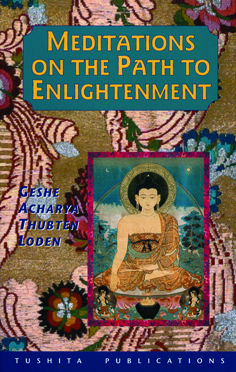By Jean D’Cruz
In this new series, we are featuring a selected passage from one of Geshe-la’s books, with a senior student then offering points to consider as we read the passage. Here, Jean D’Cruz reflects on Geshe-la’s teachings on the practice of rejoicing from Meditations on the Path to Enlightenment.
“Rejoicing is the supreme method for completing one’s collection of merit. Je Tsong Khapa told us:
The Buddha said rejoicing is the supreme virtue.
With little effort, enormous collections are completed!
If we rejoice in the merit, qualities and good results experienced by others by appreciating and admiring them, we create the cause to gain these same things for ourself. It is therefore most empowering to the mind to rejoice in the merit, qualities and high status of Buddhas, Bodhisattvas, Solitary Realisers, Hearers and ordinary beings. Rejoicing accumulates limitless merit easily and is the opponent to jealousy. It is the cause of beauty and the special attractiveness of a Buddha’s body.”
From: Meditations on the Path to Enlightenment, page 45.
Rejoicing is a supreme method for collecting merit. It is interesting that in the seven limb practice, rejoicing follows straight after confession. Confession is when we reflect on the mistakes we’ve made, on our negative minds, have regret for them and make amends. Rejoicing is when we reflect on the virtue and positivity of others and ourselves, and the good results arising from positive karmas.
For ourselves, we should not just reflect on our mistakes, but remember the good we have done – both small and large. Often we forget to feel happy about our positive minds and actions. This is something we can think about every day.
We also rejoice in the positive actions of others. It’s easy to get caught up in focusing on what is wrong, what is unsatisfactory, and from this to despair. When we are sensitive to others’ goodness – their ethics, kindness, tolerance and so forth – this elevates our mind.
We can rejoice in the merit of the Buddhas by thinking about their vast accumulations of merit, qualities and supreme actions to benefit limitless beings. We can rejoice in the merit of the Bodhisattvas and their practice of the six perfections and care for all beings.
We can rejoice in the merit and good actions of people who are making a public positive contribution to the world through generosity, charities, bravery for speaking out, environmental concern and so forth. But around us, friends, family and colleagues regularly do small acts of kindness and positivity. There is a lot to rejoice in if we look for it.
We should also rejoice when we see someone enjoying good things in their life – conditions, a good job, success in their professions, or the development of their wisdom. This helps us to overcome any feelings of jealousy, or feeling of misfortune that we are not experiencing similar things in our lives.
If we can rejoice in the qualities and happiness of those who have harmed us, or those we dislike, this becomes a powerful opponent not only to jealousy but also to anger.
Rejoicing in others’ positive actions, not only uplifts our minds, but makes it easier for us to express those attributes in future. For example, if we rejoice in people’s generous actions, it’s going to be easier for us to be generous in the future. This feeling of being happy and positive about the action inclines us to doing this ourselves in future.
We can also rejoice in our own merit.
We can recollect all the virtuous actions and thoughts we have had in the past and present as well as those we aspire to in the future and rejoice in them. We rejoice in the opportunity we have to practice the dharma. This is the result of our previous accumulation of merit. But we need to be a bit careful when rejoicing in our own actions and positive qualities that we don’t have arrogance. We rejoice in a realistic way, not in an arrogant or conceited way.
Geshe-la has said that if we can really rejoice, then we can accumulate limitless merit.
We often find rejoicing hard to do because of our jealousy and competitiveness, but it is a practice worth cultivating on a daily basis. What have you seen today that you can rejoice in?

